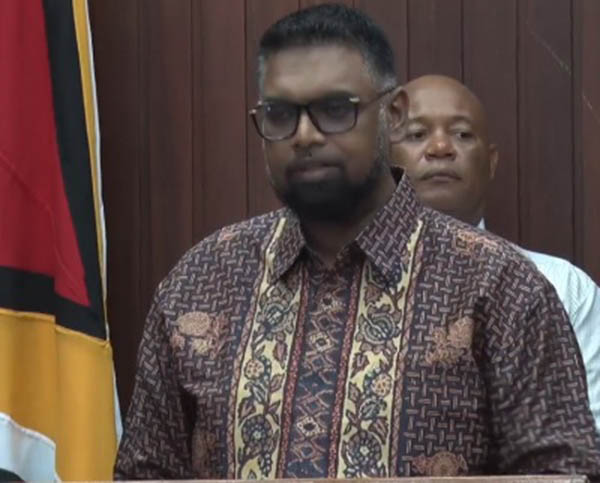After more than two years of persistent lobbying by the private sector, in the wake of oil production, government yesterday announced that it would be seeking expressions of interest (EoIs) to build a 30,000 barrels-per-day oil refinery here.
“You will see new expressions of interest coming out soon. And we are asking investors across the world to participate fully…We are looking at the launch of an expression of interest for a 30,000 barrel refinery. This expression of interest will be launched soon,” President Irfaan Ali yesterday announced at a presentation for the Guyana Office for Investment’s (G-Invest) ISO 9001 certification.
Chief Executive Officer of G-Invest, Peter Ramsaroop, later explained that his office had been receiving many proposals to build a refinery and a decision was taken by the government to look at all of the alternatives before deciding on a way forward.
He noted that seeking sustainability has become more important to government, as Russia’s war with Ukraine showed how fast changes could occur to affect the dynamics of trade and energy reliability
According to Ramsaroop, environmental concerns will also be focussed on in the call for the EoIs, but he is confident that technology today would provide a modular refinery with low emissions.
“We have been having a lot of proposals coming in for an oil refinery and I think the government has decided to look at it from a holistic perspective. Let’s see how those proposals come in and ensure we continue to look at the environment. New technologies in the refinery today have minimal emissions so all of that will be looked at during that EoI process that the president announced.”
“If you study what has happened in the world today with the war in Russia, how fuel prices have gone up; I think it is important for Guyana to look at how it can sustain itself in the long-term and the refinery is just one more step looking at our needs in the near future,” he added.
Last December, the United Kingdom-based Argus media had reported Minister of Natural Resources Vickram Bharrat as saying that Guyana was considering more than 10 proposals for oil refineries but that government was cautious.
The media entity had noted that the prospect of a refinery had been raised with the president when he had met with Mexican investors in December of last year.
Then in May of this year, Yahoo Finance reported Bharrat again speaking on the country’s consideration of proposals saying that government was “seriously considering” it, especially as fuel prices worldwide had risen following the war in Ukraine.
“We have received several proposals from countries around the world. It is a decision we have not taken yet,” the minister had told a panel at an oil conference in Texas.
Before the COVID-19 pandemic and Russia’s war on Ukraine, Guyana had been warned by experts that bringing a refinery here would not be the best of options, given the environmental implications.
Chatham House fellow and oil consultant, Valerie Marcel, had back then said that Guyana’s green energy transformation could be realised if it doesn’t buckle to pressure for downstream investments in oil here and the country should instead focus on diversification,
“There will inevitably be temptations to pursue a different course. There will be pressure to bring the oil to shore and to transform it in Guyana. There will be clamouring for a refinery. And probably for cheap oil and gas feedstocks to support Guyana’s industry, and subsidised gasoline and power for consumers. There will be political pressure to benefit from the physical oil,” Marcel had said, during her presentation at the Guyana Petroleum Summit.
“We are in an energy transition and we know oil is not forever. We don’t know when oil demand will peak but industry views are broadly aligned around the idea that it will peak.
What does this mean for Guyana? Essentially it means that it must reap benefits while it can, limit its dependence on the oil sector, invest in diversification, create long-term wealth and save for the future,” she said.
Marcel, a researcher at the not-for-profit London-based think tank, is the project lead for the New Petroleum Producers Discussion Group – a peer-to-peer network of 31 emerging oil and gas producers – who share lessons learned with each other on how to navigate the first steps of developing oil and gas. The group does not have a policy view, nor does it advise governments to pursue specific policies. Rather it lays out policy options, and with the help of other emerging producers sharing their experiences, it explains the risks and rewards associated with each policy option.
The consultant who has been involved in the group since its founding in 2012, had told participants that it is from that vantage point that she has been able to witness the progression of Guyana; from exploration days, “when it was a frontier country, to discovery, to more discoveries, to development and soon to production.”
She said that this country can learn from emerging producers, especially the new producer countries, such as Ghana.
“Ghana has nine years production history. Unlike Saudi Arabia or Norway, which took the reins of their oil sectors decades ago, Ghana remembers how it took the first steps in developing its capacity and institutions to manage the oil sector. That memory is fresh and that experience is very valuable to a country like Guyana,” she said.






